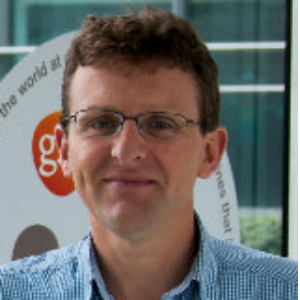
Dr Duncan Richards, medicine development leader, GlaxoSmithKline, Cambridge
What do you do? and what is a typical week for you?
I have 2 main roles.
As a medicine development leader I am responsible for one of GSK’s drugs in later stage clinical development. This is a multidisciplinary team covering all aspects of the development of a medicine. As a clinician I contribute to the clinical plan but in this role I am responsible for all aspects of development. The challenge of this role is to lead a team effectively when one is not the content area expert for many of the questions that arise.
As Director of GSK’s phase 1/ experimental medicine unit in Cambridge I am involved in the design and conduct of decision making studies in early clinical development across the GSK portfolio. First in human and early clinical studies are the first opportunity to establish that a potential medicine has characteristics to deliver the patient benefit desired. These studies are commonly small scale but very intense. Ensuring patient safety is fundamental and as a clinician I am responsible for medical governance throughout these studies.
My job is actually largely office based but there is no fixed timetable, which is one of the major pluses of working in drug development. A normal day for me may include internal meetings to set the strategy for a project but also meeting with external collaborators and experts to discuss specific issues on studies, for example how best to use a novel imaging technique to monitor a disease condition.
I also receive data to review in order to understand what’s going on in the trial. It’s a fun job because you’re up and about a lot, you need to be proactive and decide who you need to talk to in order to fix a problem.
What qualifications and experience do you have?
As a medical student I had clinical pharmacology lectures and found them fascinating. My main interest was in how drugs work. Once I qualified I worked as a Senior House Officer and then a clinical lecturer in clinical pharmacology job came up in Oxford. I thought that was exactly what I wanted to do and I was lucky enough to get it! This helped me to further narrow down what exactly I wanted to do and I realised I was most interested in the science of how new drugs work. At that time, it was very challenging to do drug discovery in academia (although that’s improving now) so it was clear to me that I needed to move into industry to be able to focus on new drugs. It was a natural progression into a research-based pharmaceutical company and I’ve been at GSK ever since. I had done a sabbatical at GSK and then they set up an experimental medicine unit in Cambridge. Again, it was a perfect opportunity for me at the time when I had finished my clinical pharmacology (CPT) training. The job was about phase 1/new drugs so fitted perfectly with my interests.
What’s the most interesting aspect of your job?
I absolutely love working on cutting edge science because it’s the most exciting and you get the chance to work with people at the top of their game clinically and scientifically. Also, you get to do something that no one has ever done before.
I have worked on drugs that have gone all the way through into clinical use. An exciting, very recent, piece of work was on a new approach to treat systemic amyloidosis. We have worked with Professor Sir Mark Pepys and his team at UCL for five years to undertake a clinical trial and we have shown that the mechanism works to clear amyloid deposits from patients. It is a great milestone for the new intervention and it will be moving to phase 2 trials soon.
What are your research interests?
For my team the sort of people we are looking to recruit will have their CCT (certificate of completion of training) and having evidence of research experience would be a strong advantage. If you move into industry you can train for a CCT in pharmaceutical medicine, which is a good speciality, but we need a mix of expertise. My strong recommendation, if you would like to be involved in research and development in the pharmaceutical industry, would be to do your PhD and qualify with your CCT and then make the move. A CCT in a speciality like CPT offers advantages as research training forms a key part of this programme. Also, you always leave the door open for a move into (or back to) academic life. If you can do a sabbatical while you are training that’s even better. Many people do move at Senior House Officer (now a second year Foundation doctor or very early in specialty training) level, qualify in pharmaceutical medicine and tend to get involved in medical affairs and have a more commercial focus.
The reason that a solid research background is so important is because drug development is difficult! You will be dealing with very senior academics at the forefront of their fields and working on complicated science. You really need to have the experience to navigate through that.
What one piece of advice would you give to someone seeking a career in clinical pharmacology?
Making a medicine is really exciting and it’s a privilege to do it – you need to be motivated by that and the fact that a clever piece of science can make a difference to patients.